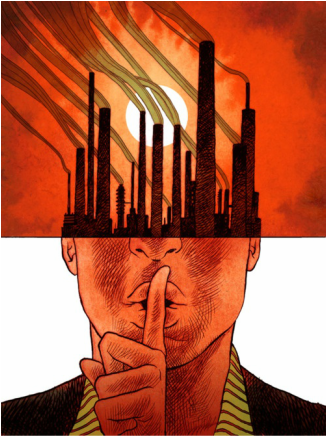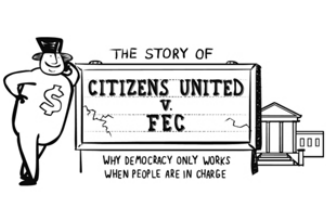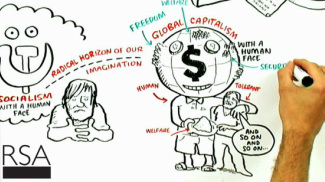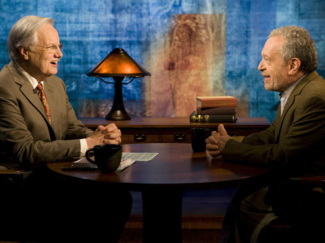 The intersection of teen identity, consumption, and social media. The intersection of teen identity, consumption, and social media.
Tags: children/youth, consumption/consumerism, corporations, marketing/brands, media, science/technology, identity, internet, social media, teenagers, youth culture, subtitles/CC, 21 to 60 mins
Year: 2014 Length: 53:41 Access: PBS Summary: This 2014 PBS Frontline documentary, Generation Like, serves as a nice updated follow-up to the popular 2001 documentary, The Merchants of Cool. As in the 2001 episode, Generation Like explores how large corporations and marketing firms seek to tap into young consumer markets. However, unlike the teens that came of age during the making of The Merchants of Cool, today’s young adults are navigating a radically different media and advertising environment, namely, one dominated by social media. As explained in this plot summary, “Thanks to social media, today's teens are able to directly interact with their culture - artists, celebrities, movies, brands, and even one another - in ways never before possible. But is that real empowerment? Or do marketers still hold the upper hand? In Generation Like, author and FRONTLINE correspondent Douglas Rushkoff (The Merchants of Cool, The Persuaders) explores how the perennial teen quest for identity and connection has migrated to social media - and exposes the game of cat-and-mouse that corporations are playing with these young consumers. Do kids think they're being used? Do they care? Or does the perceived chance to be the next big star make it all worth it? The film is a powerful examination of the evolving and complicated relationship between teens and the companies that are increasingly working to target them.” While this documentary would be useful for teaching ideas related to teen consumption and corporate advertising, it could also serve as a useful way to examine characteristics of the generational cohort following the Millennials, who have been dubbed "Generation Z." Submitted By: Valerie Chepp
105 Comments
 John Oliver examines what's behind stylish cheap clothes. John Oliver examines what's behind stylish cheap clothes.
Tags: capitalism, consumption/consumerism, corporations, economic sociology, globalization, apparel, fashion, supply chains, sweatshops, 11 to 20 mins
Year: 2015 Length: 17:09 Access: YouTube Summary: In this clip from Last Week Tonight, John Oliver analyzes the rise of fast fashion and its tremendous profits. Fast fashion includes short times from design to rack, with fashion styles changing constantly at companies such as H&M, Zara, and Forever 21. But news commentators are shown marveling at the very low costs of the trendy, fashionable clothes. Given these low costs, Oliver asks “How does any clothing company make money?” After all, the industry has many billionaire founders and executives, whose companies excel with high-volume sales. The reality is that 2% of clothing worn by Americans is made in the US, while the rest is produced overseas and often in sweatshop conditions. Oliver frames this in terms of the outrage over sweatshop clothing producers in the 1990s, by companies such as Nike, Gap, and most famously, Kathie Lee Gifford. In response to protests, many of these large companies agreed to monitoring programs in their supply chains. So how have their production conditions changed? In more recent years, undercover journalists investigating Gap and Wal-Mart found child slaves; non-compliance with workplace safety standards; and repeated denial of responsibility for any wrong-doing. One particular issue is that contractors producing clothes for Wal-Mart must follow certain standards, but contractors frequently send this work to sub-contractors; when the sub-contractors violate labor standards, Wal-Mart denies any knowledge that their clothes were being produced in these factories. However, this issue is far from an isolated event, and Wal-Mart repeatedly denies awareness of these issues. This dynamic is not unique to any manufacturer, but it reflects supply chain issues that are fundamental to the global economy, and are an important part of understanding global inequality and our own participation (as consumers) within it. Submitted By: Paul Dean  Atmospheric CO2 is at 400 ppm & climbing (Image credit: Koren Shadmi) Atmospheric CO2 is at 400 ppm & climbing (Image credit: Koren Shadmi)
Tags: capitalism, corporations, environment, buen vivir, climate change, climate crisis, climate justice, corporate social responsibility, environmentalism, extractivism, false solutions, fracking, global warming, political ecology, tar sands, 00 to 05 mins
Year: 2015 Length: 3:06 Access: YouTube Summary: In January 2015, scientists recorded atmospheric levels of carbon dioxide above 400 parts per million on a regular basis—the first time such a level had been detected so early in the calendar year. It is well established that levels of CO2 above 350 (already well above the pre-industrial norm of 275 ppm) spur global warming. As observed in Texas, Oklahoma, California, and countless other places around the world, we are now experiencing the effects: extreme weather, droughts, rising sea levels, thawing permafrost, etc. Levels above 450 will most likely put the planet on an inescapable course toward catastrophic climate change. • 400 ppm is an eco-political music video, which encapsulates the climate crisis and climate justice in just three minutes. It is an intervention in popular political ecology/economy, aimed at those who are uneasy with the increasingly obvious deterioration of the living systems of which we are an inextricable part. It might also be a useful way of beginning a critical discussion about the human causes of climate change. • The song begins from basic observations—symptoms of the crisis—and then shifts to the ideological problem of denial, softened in recent years by massive corporate social responsibility advertising and complemented by the emergence of ‘silver-bullet’ geo-engineering schemes. At the song’s midpoint, its bridge identifies the structural drivers of the crisis: carboniferous capitalism, and the contradiction between compounding capital accumulation and the principle of homeostasis which governs the biosphere. The next verse underlines that point and invokes, with the wheel of fortune, a financialized casino-capitalism inured to its material ‘externalities.’ Wes Carroll’s spirited guitar solo is accompanied by images from Canada’s notorious Tar Sands, of bitumen extraction and what it leaves behind. But at this point the video begins to arc toward hope, with footage from the Tar Sands Healing Walk (featuring Cree activist and writer Clayton Thomas-Muller)—an annual event since 2010 bringing together Indigenous activists, environmentalists and others. • The last verse gestures toward a just transition—a power shift—to a post-capitalist future that combines global justice and solidarity with ecological stewardship, and that abandons the consumer-capitalist logic of always having more, in favor of buen vivir: ‘living well.’ To get there, we had better start healing what Karl Marx called the metabolic rift between capitalist extractivism / accumulation and the conditions for a vital ecosystem. Mass popular struggle, building on but going beyond the September 2014 People’s Climate March (the final image), is a necessary condition for such a radical remaking of our world. Submitted By: Bill Carroll  Image by Will Varner Image by Will Varner Tags: corporations, crime/law/deviance, foucault, goffman, government/the state, science/technology, theory, back stage, edward snowden, glenn greenwald, mass surveillance, n.s.a., panopticon, surveillance state, 00 to 05 mins, 11 to 20 mins, 21 to 60 mins Year: clip 1: 2013 | clip 2: 2014 Length: clip 1: 20:41 | clip 2: 5:38 Access: YouTube: clip 1: TED Talks clip 2: New York Times Summary: Taken together, the above two clips make three distinct points about why we should all take the unfolding revelations about N.S.A. surveillance very seriously, and the clips can be used to kick off a sociologically-informed discussion about the surveillance state and it's practice of mass surveillance. 1) In the first clip, journalist Glenn Greenwald delivers a TED Talk where he argues against the claim that only criminals have something to hide. People should take the N.S.A. revelations seriously because everyone has something to hide, even those of us who believe ourselves to be innocent of all crimes. After all, people routinely lock their bathroom doors and use passwords to access their email. To borrow a page from sociologist Erving Goffman, people all have a back stage. 2) In the second clip, journalist David Sirota argues we should take state surveillance seriously because the fact is, we are all criminals. That is, there are so many statutes on the books that virtually anyone could be found guilty of a crime. Chances are that even those who loudly profess they have nothing to hide have unknowingly committed crimes, and as the amount of data being collected and saved increases, the state stores aways more and more opportunities to charge any given citizen of a crime should it prove politically expedient to do so. 3) Finally, Greenwald alludes to a long standing observation in sociology that surveillance changes people; it controls them, even if charges of a crime never materialize and no formal interaction with the criminal justice system occurs. People drastically, if unknowingly, alter their behavior when they suspect they are being watched. No where is this reality more vividly illustrated than in what philosopher Jeremy Bentham described as a panopticon, a prison tower that offers a vantage point from which a guard can see all prisoners in their cells, but does not offer any single prisoner the ability to know whether he or she is being observed. Bentham imagined it as a means of controlling prisoners, but subsequent thinkers—namely Michel Foucault—have used the idea of a panopticon as a metaphor to describe the distinct way in which modern states exercise power and control. The prison tower is now the speed camera inconspicuously perched atop a traffic light; it's also the tablet that tracks it's user's browsing history. This architecture, which claims to exist for the purpose of reducing criminal behavior, is already also changing non-criminal behavior as well. Consider the journalistic practice of offering sources anonymity. As the surveillance state becomes ever more bold, the ability to promise such anonymity slips away, and some would argue, so too does an important check on government power (Note: The Sociological Cinema has explored the topic of the surveillance state here, here, and here, and we maintain a Pinterest board on the topic). Submitted By: Lester Andrist  Political agendas enter into scientific discourse. Political agendas enter into scientific discourse. Tags: corporations, environment, government/the state, politics/election/voting, science/technology, campaign financing, climate change, global warming, house of representatives, political bias, 06 to 10 mins Year: 2014 Length: 10:25 Access: The Daily Show Summary: This segment from The Daily Show spotlights a recent hearing of the U.S. House Committee on Science, Space, and Technology, in which President Obama's plan to decrease carbon emissions by 30% by 2030 was discussed. The video would be useful for explaining political bias, the relationship between wealth and power, and the power of corporations in elections. The clip includes footage from the hearing, in which several politicians interrogate Presidential Science Advisor John Holdren about whether climate change is a reality, despite the fact that, by now, the scientific literature has overwhelmingly shown that climate change is a massive global threat for humanity. In this video, U.S. Representatives Steve Stockman (R-Texas) and Larry Bucshon (Indiana-R) refute global warming, despite their inability to provide viable evidence. Indeed, Congressman Bucshon argues that people should trust public comments rather than scientific literature because, in his opinion, “The climatologists...depend on the climate changing to keep themselves publishing articles." He concludes that, "I could read that, but I don’t believe it.” At the end of the clip, Jon Stewart points to Stockman's interest in denying climate change, revealing that his three major campaign donors are big energy companies. This video would work well in combination with another clip on The Sociological Cinema, which illustrates how, despite overwhelming scientific evidence, powerful interests are able to suppress knowledge by introducing doubt into public discourse. Submitted By: Nihal Çelik  Citizens United v. FEC's impact on US democracy Citizens United v. FEC's impact on US democracy Tags: capitalism, corporations, crime/law/deviance, government/the state, politics/election/voting, campaign financing, citizens united v. federal election commission, democracy, power elite, supreme court, 06 to 10 mins Year: 2014 Length: 8:50 Access: YouTube Summary: This short video created by The Story of Stuff Project explores the relationship between wealth and political power, and examines whether we can speak of democratic elections in the United States. As the video points out, Americans have lost power in their democracy because of modern corporations' single-minded focus on maximizing profits, which have rapidly grown. Although the government can, and should, intervene by setting ground rules to protect society and keep things safe and fair, the reality of the current situation is that corporations, rather than people, write the rules. With Citizens United v. Federal Election Commission (FEC) in 2010, the Supreme Court decided that it is unconstitutional to put any limit on corporations’ financial contribution to elections because it violates free speech (this also invalidated part of the McCain-Feingold Campaign Finance Reform Law). As a result of this decision, corporations can now spend unlimited sums to help elect or defeat political candidates, which makes campaign financing undemocratic. The total cost of elections (congregational and presidential) almost doubled after Citizens United v. FEC, growing from $3.6 billion in 2010 to $6.2 billion in 2012. As the video highlights, the First Amendment was written to protect real people, not corporations. How can people be in charge of democracy again? First, there is a need for a constitutional change, which would overturn the Supreme Court's decision by establishing that corporations do not have the same First Amendment rights as people. Second, in order to eliminate the power of corporations in manipulating the elections, public financing of campaigns needs to be regulated, not liberated. Finally, given that 85% of Americans feel that corporations have too much power and individuals have too little, people should speak up and take social action by fighting for the things people (and not corporations) care about, such as renewable energy, green jobs, health care, safe products, and good-quality education. Submitted By: Nihal Çelik  Žižek argues charitable consumption prolongs capitalism's ills. Žižek argues charitable consumption prolongs capitalism's ills. Tags: capitalism, consumption/consumerism, corporations, culture, economic sociology, marketing/brands, marx/marxism, political economy, theory, charity, corporate social responsibility, cultural capitalism, morality, starbucks, žižek, 06 to 10 mins Year: 2010 Length: 10:56 Access: YouTube Summary: In this animated segment of a longer lecture, Slavoj Žižek critiques the cultural dimensions of contemporary capitalism. Žižek begins by stating how capitalism has changed from a dichotomy between production and traditional charity (e.g. Soros earns money by exploiting workers then gives it back to humanist causes), to a form of capitalism that brings the dimensions of morality and consumption together. He offers several examples of this "cultural capitalism," including Starbucks and Tom's Shoes. In each of these instances, the act of consumption and doing good are part of the same process, which has now been universalized throughout capitalism. It is meant to make people (i.e. consumers) feel good about themselves in that they are helping poor people or a degraded environment. However, Žižek argues that by participating in this system, consumers are actually "prolonging the disease ... rather than curing it." He promotes changing the structure rather than this sort of charitable act: "The proper aim is to try and reconstruct society on such a basis that poverty would be impossible and the altruistic virtues have really prevented the carrying out of this aim." He compares this system to slave owners who were kind to their slaves because they prevented oppressed slaves from realizing the core injustice of slavery; in other words, it suggests that we are doing enough to address the system's ills and prevents more significant change. While there is an implicit argument to do away with capitalism here, Žižek explicitly states that 20th century socialism was a "mega catastrophe" and does not promote a return to that system. The clip also works well to initiate critical discussions of corporate social responsibility, Fair Trade, and other social certifications, and begin to imagine what more radical alternatives might look like. Submitted By: Paul Dean  Robert Reich discusses economic inequality with Bill Moyers Robert Reich discusses economic inequality with Bill Moyers Tags: capitalism, class, consumption/consumerism, corporations, crime/law/deviance, economic sociology, globalization, government/the state, inequality, organizations/occupations/work, political economy, politics/election/voting, science/technology, robert reich, social mobility, subtitles/CC, 21 to 60 mins Year: 2013 Length: 56:46 Access: Moyers & Company Summary: In this interview on Moyers & Company, former Secretary of Labor and professor of public policy at the University of California in Berkeley, Robert Reich discusses economic inequality and the worrisome connection between money and political power. Reich notes that "Of all developed nations, the US has the most unequal distribution of income," but US society has not always been so unequal. At about the 6:20 mark, the clip features an animated scene from Reich's upcoming documentary, Inequality for All, which illustrates that in 1978 an average male worker could expect to earn $48,302, while an average person in the top 1% earned $393,682. By 2010, however, an average worker was only earning $33,751, while the average person in the top 1% earned $1,101,089. Wealth disparities have also been growing, and here Reich explains that the richest 400 Americans now have more wealth than the bottom 150 million Americans. What happened in the late 1970s to account for the current trend of widening inequality? According to Reich, there are four culprits. First (at about 19:10 min), a powerful corporate lobbying machine has successfully lobbied for laws and policies that have allowed for wealthy people to become even more wealthy, often at the expense of the poor. Examples include changes to antitrust, bankruptcy, and tax legislation. Second (at 34:00 min), Reich argues that unions and popular labor movements have been on the decline, which means employers have been under less pressure to increase wages over time. Third (at 38:30 min), while globalization hasn't reduced the number of jobs in the US, it has meant that employers often have access to cheaper labor, which has had the effect of driving down wages for American workers. He points out that in the 1970s, meat packers were paid $40,599 each year. Now they only earn $24,190. Fourth (at 38:30 min), technological changes, such as automation, have had the effect of keeping wages low. He concludes that there is neither equality of opportunity nor equality of outcome in the U.S., and unless big money can be separated from politics, the U.S. economy is unlikely to free itself from this viscous cycle of widening inequality for all (Note that a much shorter video featuring Reich's basic argument is also located on The Sociological Cinema). Submitted By: Lester Andrist  "The Scarecrow" explores the McDonaldization of society "The Scarecrow" explores the McDonaldization of society
Tags: capitalism, consumption/consumerism, corporations, environment, food/agriculture, marketing/brands, organizations/occupations/work, science/technology, theory, weber, farming, fordism, george ritzer, mcdonalidzation, rationalization, slow food, subtitles/CC, 00 to 05 mins
Year: 2013 Length: 3:23 Access: YouTube Summary: "The Scarecrow" is Chipotle's most recent commercial exploring the American dependency on highly rationalized farming techniques, which offend human conscience and wreak havoc on the environment (Note that Chipotle created a commercial with similar themes back in 2011). This animated short takes place in a dystopian universe where scarecrows punch in each day at a factory run by their crow overlords, and crow surveillance drones caw whenever production slows. The video is a useful illustration of what George Ritzer has called the McDonaldization of society, which refers to "the process by which the principles of the fast-food restaurant are coming to dominate more and more sectors of American society." Ritzer explains that McDonaldization is characterized by efficiency, calculability, predictability, and control. In and around the barren landscape owned by Crow Foods, one finds examples of efficiency everywhere. Conveyer belts efficiently move workers to their various stations in the factory, and livestock are stacked in crates, one on top of the other—an efficient use of factory space. Scanning the inner workings of the factory, it appears that ground beef, chicken, and pork are being squeezed through narrow chutes, and large blades worthy of a guillotine slice the meats into slabs with such precision that one could easily calculate and predict the amount of meat produced in any given hour. Controlling the pace of production is as easy as pulling a lever. While the video is quite literally Chipotle's straw man fantasy and is created with the aim of developing the Chipotle brand as a healthy, environmentally-friendly meal choice, the McDonaldization of food production is a very real phenomena and one sociologists take very seriously (The Sociological Cinema has also explored the issue here and here). What could be more important than understanding how a system, which was ostensibly developed to nourish vast numbers of people, is actually harmful to human health? Submitted By: Lester Andrist  Apple attaches playful and whimsical meanings to its brand. Apple attaches playful and whimsical meanings to its brand.
Tags: capitalism, consumption/consumerism, corporations, culture, economic sociology, marketing/brands, marx/marxism, media, theory, apple, commodity fetishism, emotional branding, enchantment, 00 to 05 mins
Year: 1998; 2008; 2011 Length: 0:30 Access: YouTube (clip 1; clip 2; clip 3) Summary: Branding plays an increasingly important role in contemporary capitalism. Marketing industry experts describe a brand as a vision, a vocabulary, a story, and most importantly, a promise, which consumers experience through ads and products. One form of this is emotional branding, and in his book named for this approach, Marc Gobé argues that understanding emotional needs and desires, particularly the desire for emotional fulfillment, is imperative for corporate success today. Consumers unknowingly experience emotional branding throughout Apple’s wildly successful marketing. Based on a content analysis of more than 200 Apple TV ads (1984-2013), Gabriela Hybel and I found various expression of Apples’ emotional branding. They inspire feelings of happiness and excitement with playful and whimsical depictions of products and their users. This trend can be traced to the early days of the iMac, as seen in an ad (clip 1) from 1998. A 2008 iPod Nano ad (clip 2) combined playful imagery and song. In a more recent commercial (clip 3), actress and singer Zooey Deschanel, known for her “quirky” demeanor, performs a playful spin on the utility of Siri. Commercials like these — playful, whimsical, and backed by upbeat music — associate these same feelings with Apple products. They suggest that Apple products are connected to happiness, enjoyment, and a carefree approach to life. In George Ritzer’s words, they “enchant a disenchanted world.” They open up a happy, carefree, playful world for us, removed from the troubles of our lives and the implications of our consumer choices. Importantly, for Apple, the enchanting nature of these ads and the brand image cultivated by them act as a Marxian fetish: they obscure the social and economic relations, and the conditions of production that bring consumer goods to us. Now more than ever, Apple depends on the strength of its brand power to eclipse the mistreatment and exploitation of workers in its supply chain, and the injustice it has done to the American public by skirting the majority of its corporate taxes. For additional analyses of Apple’s commercials, see how they promote sentimentality, cool youthfulness, and the promise of social mobility. Note: this post was adapted from Dr. Cole’s original blog post at SocImages. Submitted By: Nicki Lisa Cole, PhD |
Tags
All
.
Got any videos?
Are you finding useful videos for your classes? Do you have good videos you use in your own classes? Please consider submitting your videos here and helping us build our database!
|
 RSS Feed
RSS Feed
